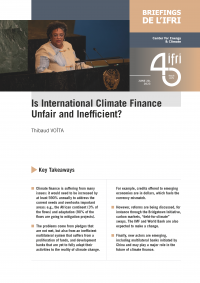
Is International Climate Finance Unfair and Inefficient? Briefings de l'Ifri, June 20, 2023
Finance is arguably the most sensitive climate negotiation topic. Different studies have shown that rich countries emit the majority of greenhouse gas (GHG) emissions, while the climate footprint of the poorest countries is much more limited.

In addition, the countries that emit the less often turn out to be among the most vulnerable to climate change, with high needs in terms of adaptation finance. According to some analysis, the 46 least-developed countries suffer from a high risk of loss and damage, and the countries that are the least at risk are in Europe. Therefore, developing countries are demanding contributions from the developed world to address their climate finance needs (both in terms of mitigation and adaptation). These demands have been somehow met with a pledge made at COP 15 in 2009, where developed countries announced a yearly contribution of 100 billion dollars (USD) by 2020. However, this pledge has not been honored.
Meanwhile, climate change is accelerating and, as a result, countries’ needs in terms of adaptation are increasing, as well as their loss and damage. The finance gap is widening and though the 100 USD billion pledge is expected to be achieved in 2023, analysis from the think tank Climate Policy Initiative (CPI) shows that it will not be enough to address the current needs. According to their analysis, the current flows need to be increased by at least 590% annually. This briefing will show that, in addition, climate finance is not accessible to the poorest and therefore increases inequalities and the exclusion of the most vulnerable countries. The Prime Minister of Barbados, Ms. Mia Motley, complains that the “international financial system […] is broken, outdated, infested with short-termism and downright unfair.


